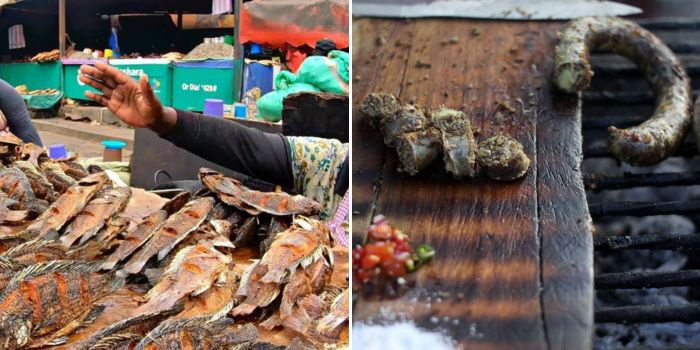In a sweeping crackdown aimed at protecting public health, Nairobi County officials have shut down several kiosks at Gikomba Market after uncovering disturbing food handling practices. The surprise operation, led by the County Chief Officer for Environment, Geoffrey Mosiria, exposed food vendors preparing and selling products in filthy, unsafe environments, including near open urinals.
Among the most shocking discoveries was fish being cleaned and sold just steps from open urinals. This appalling scene triggered immediate action, with county officers closing two kiosks and issuing warnings to several others. Seven vendors received official notices demanding urgent improvements or risk permanent closure.
“We found traders selling fish in extremely unhygienic environments, some even preparing food near areas used as open urinals. This is completely unacceptable,” Mosiria said.
But it wasn’t just fish vendors under fire. Mutura, a popular Nairobi street delicacy, was also flagged during the inspection. According to county officials, the conditions under which mutura was being prepared were just as alarming.
“To make matters worse, the mutura being sold in the same vicinity was in a similarly filthy condition, posing a serious risk to public health,” Mosiria added.
Mutura holds cultural significance and is widely enjoyed by city residents, but its safety has often come into question due to the lack of regulation and poor sanitation among some street vendors. The recent findings now push this issue back into the spotlight, raising important concerns about how beloved street foods are handled in Nairobi.
In addition to food safety concerns, the county crackdown also uncovered reckless waste disposal practices. Some traders were found dumping garbage into stormwater drains, leading to blocked sewers, environmental degradation, and urban flooding.
Worryingly, vendors have also been paying street families as little as Ksh50 to illegally dispose of their waste. This behavior was slammed by Mosiria, who called it both “irresponsible and unlawful,” warning that such actions worsen Nairobi’s ongoing waste management crisis.
The County Government has promised to ramp up routine inspections across Nairobi’s major food markets. Businesses caught violating hygiene standards will face steep penalties—including licence revocations and closures.
“We are hell-bent on ensuring hygiene practices are followed. Traders who fail to clean up their act will face consequences,” Mosiria warned.
This operation sends a strong and urgent message: street food in Nairobi must be clean, safe, and prepared under hygienic conditions. With public health and environmental safety hanging in the balance, Nairobi County is taking a stand, and calling on traders to do better.





